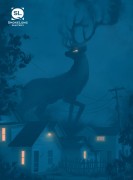This is a beautiful story about what a person deciding what to take note of in the face of calamity. I was particularly struck by the things the narrator documents—after the first sentence, words are hardly mentioned—and by the instruments used: symbols and doodles, a taped bandage, Polaroids, a graphite rubbing of tire treads, a hole punch recording the “glum shine” of stars. They become less and less “likely,” but convey their own lyrical truth. Could you talk about note taking, in this story and in life? Are you a good note taker?
I’m a terrible note taker. I use one notebook for everything, so I’ve often gone back to college or grad school notebooks looking for class notes only to find a few lines of rigorous notes that turn into a journal entry or a short story with no indication. I’ll find a chunk of writing and have no way of knowing whether it’s a journal entry or a fiction, so I’ll be thinking wow, I was really going through a rough time there—and then I grew a shell and turned into a snail, apparently?
This story was inspired by a real thing that happened: two summers ago, I woke up to a bunch of missed calls and my mom was in the hospital. My mom is a nurse, so she is the rock of our family whenever anyone else is in the hospital: She’s the one who is able to communicate with doctors. Since in this case she couldn’t be in that role, I figured I would have to try, which meant writing down every single thing I could—to the point where it did almost get a little absurd. I had a list of nurses’ names with their physical descriptions because I knew at some point my brother would come take over for me and I wanted him to know who everyone was. I don’t know if any of it was remotely useful.
The reader enters “Taking Notes” in the middle, with almost no back story or explanation except that there was a fall by the narrator’s mother. While writing, did you, do you, have an idea of the parts of the story the reader doesn’t know and doesn’t need to know? How do you decide what to include and what to leave out of a story?
I did! It’s funny; I think of this as mostly nonfiction, but when I look back, I realize that isn’t true at all: In that time in my life, there were plenty of other people bustling in and out—we were at the hospital where my mom works, so she had many friends visiting, lots of family came to see her, and my boyfriend drove me to the hospital and was around most of the time. I excluded all of that because I was trying to get to the truth of how I felt at the time, so I didn’t want to make room for other characters (although I very much appreciated their presence at the time).
This piece is very compressed—three concise paragraphs. You have also published typical-length short stories and essays and have spoken of working on a novel. What dictates the form a work will take in terms of length and approach?
In regard to this one, I set out to write a very short story, and those parameters made the other decisions easy. I tend to choose a form very early in having an idea, and that form then shapes the idea.
In a recent guest blog post, you quote the last two lines of Yeats’ poem “The Circus Animals’ Desertion,” which may be my all-time favorite passage of poetry. What are some of your influences, literary or otherwise?
Oh, I love hearing that! I love that poem so dearly. I fell for it when I was twelve and didn’t understand it at all, so it keeps yielding new meanings the longer I live with it. My other influences for short writings with any poetic sensibility at all are Sarah Manguso, Matthea Harvey, Kathy Fish, Richard Siken, Ocean Vuong. For full-length short stories, my favorites are Karen Russell, George Saunders, Hannah Tinti, Laura van den Berg, and Claire Vaye Watkins, and for novels I’m influenced by Justin Torres, Catherine Lacey, Madeline Miller, Jesmyn Ward, Lauren Groff, and Claire Messud. Ideally, I would like my writing to be a composite of all the aforementioned brains.
The last line—”I am keeping you safe”—is so brave and resolute. What do you strive to keep safe?
Oh, that one’s easy. My mother. And anyone or thing else that I could fathom to keep safe through close and obsessive observation.


